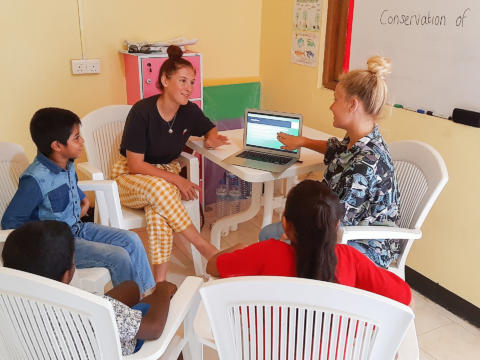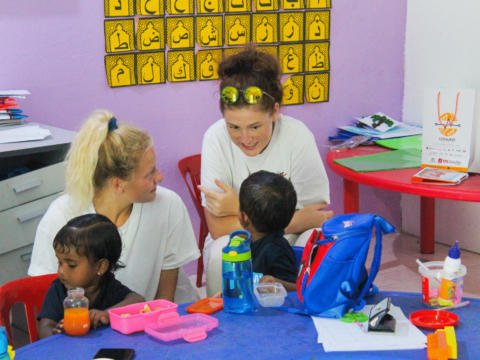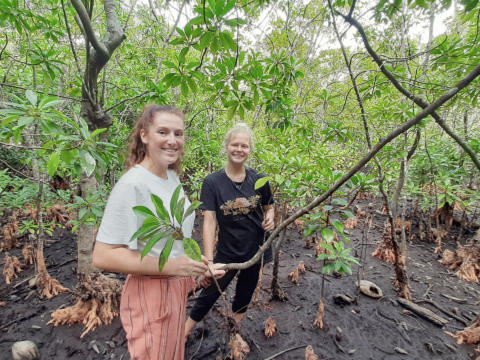Only 1,140€ per week!
Marine and Turtle Conservation
Gaafu Dhaalu Atoll - Maldives
Gain hands-on experience working in a marine environment with incredible animals such as turtles!
This program offers you a chance to gain knowledge and experience in a variety of ecosystems surrounding the island, learn more about coral reefs and what organisms you can find in them and contribute to one of the largest databases for coral surveying on Coral Watch. During your time, you also get to learn about what local life is like in the Maldives.
Program Description
This program is a great chance to get involved in marine conservation and work closely with amazing sea turtles. Sea turtles are brought to the turtle rehabilitation centre after being kept as pets or after being found in the wild injured/sick, these turtles will then be rehabilitated and kept in the centre until they are ready to be released. The program is run by our resident marine biologist, allowing you to learn from and work with other ocean enthusiasts. You will also take part in coral gardening in an attempt to restore the degraded reefs. There is an opportunity to learn and take part in reef monitoring, to record the health of the surrounding reefs.
You will be given the chance to immerse yourself in a different culture and experience the 'real' Maldives. The Maldives is far more than just luxury resorts.
Turtle Conservation
Our marine program is extensive and relies on participant support to help us achieve all our project aims. Simply put, without you, we would not be able to ensure the upkeep and continued operation of our turtle rehabilitation centre. Monitoring work is time-consuming and extensive so we require all the help we can get in maintaining our coral frames and surveying local reefs.
You will work closely with our resident marine biologist. Daily tasks are varied and may include:
- Cleaning and feeding the rescued turtles
- Conducting reef surveys on atoll islands
- Cleaning the coral frames/assessing coral health
- Organizing community beach cleans/marine awareness sessions
Coral Conservation
Coral Survey
We carry out coral surveys on the house reef in various locations collecting data on the corals we find in the Maldives. This includes branching, boulder, plate and soft corals. The patterns we are looking are the colour changes between each colour and colour variations between each location. This allows us to track the progress of each reef, including whether bleaching is becoming more abundant or whether a reef is recovering from the effects bleaching.
Coral Planting
This activity involves collecting healthy coral polyps from fruitful reef locations. These are then securely placed in areas of reef that are suffering. This encourages the organisms to colonies in the distressed areas of reef and initiates healthy development of corals.
Coral Farming
Carrying out coral farming is one of the most popular ways of conducting coral conservation. Similar to coral planting, healthy polyps are collected from the reef. However, these pieces are then attached to a metal-framed structure and placed in an area suffering from coral degradation. These corals attract a variety of marine organisms which help to encourage the growth of the corals to form a successful area of coral reef restoration.
We recommend you to arrive in the Maldives on a Saturday and start the program on Sunday onwards. In the Maldives, Fridays and Saturdays are holidays.
Aims & Objectives
To rehabilitate and release sea turtles and help conserve the marine life and the coral treasures.
Schedule
Sunday to Thursday
Your daily work will include the following activities. Apart from these activities, you may be required to assist with various tasks and activities at the centre depending on the needs at the time.
- Cleaning tanks
- Feeding the sea turtles
- Assist visitors when required
- Twice a week we will teach at local schools, here we educate them about marine conservation and the importance of a healthy ocean.
- Cleaning the tanks
- Feeding the sea turtles
Other activities:
Activities during your time may vary. We also encourage you to snorkel as much as possible as time permits and learn about the fish, coral and invertebrates in the Indian ocean. It also helps us in our surveys and also in the awareness programs we conduct to education the locals.
There will also be excursions, reef monitoring and coral gardening depending on the day.
Note: This schedule can be changed and/or amended depending on weather conditions, local conditions and unforeseen circumstances.
Participant Criteria & Requirements
Standard Requirements
Minimum age: 18
Maximum age: 60
Minimum English level: Basic
CRB required: On Signup
Passport copy required: On Signup
Resume copy required: No
Required qualification: None
Additional Requirements
There are no additional requirements.
Additional Equipment
Snorkeling Gear (Goggles / Snorkel / Flippers)
Life Jacket – optional
Underwater Camera / Go Pro
Clothes you don’t mind getting dirty
Rashie top for snorkeling (Woman)
Location
The programs are based on Hoandedhdhoo, in Gaafu Dhaalu Atoll. It is the second most southern atoll in the Maldives located just 8 miles north of the equator. The island is home to around 1200 people (2006 National Census), who spend the majority of their time fishing, playing football or the traditional Maldivian sport called ‘Bashi’ and relaxing! The island is surrounded by stunning coral reefs that house marine animals such as turtles, rays and many amazing fish!
As a participant, you will have the opportunity to snorkel along these reefs and witness the natural beauty of the Maldives! It takes approx. an hour and a half to reach Hoandedhdhoo from Male International Airport, consisting of a plane journey and a boat ride.
The island is a very safe community full of friendly and welcoming inhabitants. Wherever you go you are sure to get a warm welcome so plenty of opportunities to make friends and learn more about the local life!
About the Accommodation
The house consists of 3 separate buildings. There is a total of 9 rooms that house up to 6 people in each. Each room has its own en suite bathroom with a shower plus hot running water. All rooms have air conditioning units to ensure participants are comfortable at all times, the temperature can be changed to their preference.
Each room also consists of, single/bunk bed units, wardrobe, cupboards with individual keys to lock away valuable items and a desk unit with a mirror. Rooms are allocated based on a single-gender basis. There are 2 gardens located between the 3 buildings where you and locals can socialise in the day time. There are also two showers in one of the gardens for you to use when returning from activities. When you wish to wash their clothes there are 2 washing machines, one in each garden and clothes can be hung on the line to dry.
Food Arrangements
The meals would mainly include typical Maldivian food. Purified water will also be available throughout your stay.
Facilities
There are shops where you will be able to buy most of the things you may require. Money can be exchanged at the airport on arrival in Male. We highly recommend changing your money here as it is difficult to do on the local islands. We also suggest keeping the receipt for this exchange as if you have money left over at the end you can change it back to your preferred currency.
There are ATM’s available on Thinadoo, there is a daily speedboat ferry from the connecting island Madaveli Saturday-Thursday. A trip can be arranged but at an extra cost to cover the fuel. Therefore, when you arrive at the airport, we recommend taking out more money than your budget for in case of emergencies.
Activities & Events
No scheduled activities outside the program.
Sights & Surroundings
As it is a small island there are limited activities to do in your spare time, however, you can go to local café designated or take a walk to the beach and watch the breathtaking sunsets. You can also spend your spare time enjoying some of the many activities on the island. Locals are huge fans of football, volleyball and Bashi – a traditional Maldivian women’s sport. If you are a person who loves water activities, then you are in the right place. The ocean plays the role of a big playground.
We can go on a variety of exciting excursions around the Huvadhoo Atoll and always take into account what you as a participant would like to do with your time. Examples of some of the excursions include snorkelling trips, night fishing trips, BBQs and visits to uninhabited islands. There is an opportunity to take a day trip to a resort or go on an overnight stay at an uninhabited island; however, these are optional excursions as they require an extra payment to cover transport and necessities.
You may also get the chance to go on reef surveys of the neighbouring islands with our marine team. During your free time on the island, we encourage you to get in the sea as much as possible and take photos of the marine life and islands. We have a wonderful little community here and there are some fantastic sights and scenery to take in as you walk around our island.
Transportation
From this location we do not provide free transport to other locations.
Quick Facts
Name: Republic of Maldives
Population: approx. 373 362
Capital: Malé
Language: Dhivehi
Currency: Maldivian Rufiyaa (MVR)
Time zone: UTC +5
Country Information
The Republic of Maldives is a chain of islands located in the Indian Ocean. Compared to other South Asian countries, Maldives is the smallest, and spans around ninety thousand square kilometers. It also bears the smallest population among the Asian countries. Maldivians mainly practice Islam. Even the legal system of the country is shaped by their practice of Islam.
Due to the stretch of atolls, Maldives is also considered as one of the most dispersed countries in the world. It has a total of 26 atolls. Your visit to this country will be a memorable experience as you will be lucky to enjoy in the golden beaches and crystal waters, travel from island to island and experience the unique lifestyle of the Maldivians.
Maldives has a tropical monsoon climate, and it is also popular for its rich variety of coral reefs and diverse range of fish, whales, dolphins and other forms of sea life. Due to these reasons, Maldives has become one of the top attractions among travellers worldwide.
Climate
Maldives has a tropical monsoon climate. That being said, the climate in Maldives can be divided into two main weather patterns namely, dry and wet seasons. Even though the weather is categorized into two seasons, the temperature throughout the year changes very little. However, the dry season exists from January to around April.
Culture
Due to the proximity of this country to South India and Sri Lanka, the culture of Maldives has been influenced by the cultural patterns of these two countries. Particularly, music and dancing has been influenced by India and language has been influenced by Sri Lanka to a certain extent. Like any other Asian countries, nationals of Maldives respect elders while following the Islamic way of living.
In addition, since the descent of the Maldivians can be traced back to several countries such as Sri Lanka, India, Africa, and Arab countries, the culture represents some characteristics of these countries as well.
During the month of May or June, Maldivians celebrate the Ramzan festival. The actual dates and the time of the festival may vary depending on the Islamic lunar calendar. This is the largest religious festival celebrated in Maldives. This festival spans for 30 days and during this time all Muslim citizens fast during the day. During this festival they celebrate the revelation of the Quran to prophet Muhammad by God.
Maldives gained independence from the British on the 26th July, 1965. Since then, Maldivians celebrate their independence day marked by parades and national events.
In the month of September, Maldivians celebrate a festival named Eid-ul Al’haa which is also named as the festival of sacrifice. The actual date on which the festival is celebrated may vary depending on the calendar.
Transportation
Seaplanes
Seaplanes are one of the quick and easiest ways to travel to resorts from the airport.
Boats
Travelling from island to another can easily be done by one of the speed boats or ferries.
Taxi
Taxis are available in the major cities where a good network of roads is available.
Bus
In the main city there is a bus service which operates every 30 minutes to take you around.




